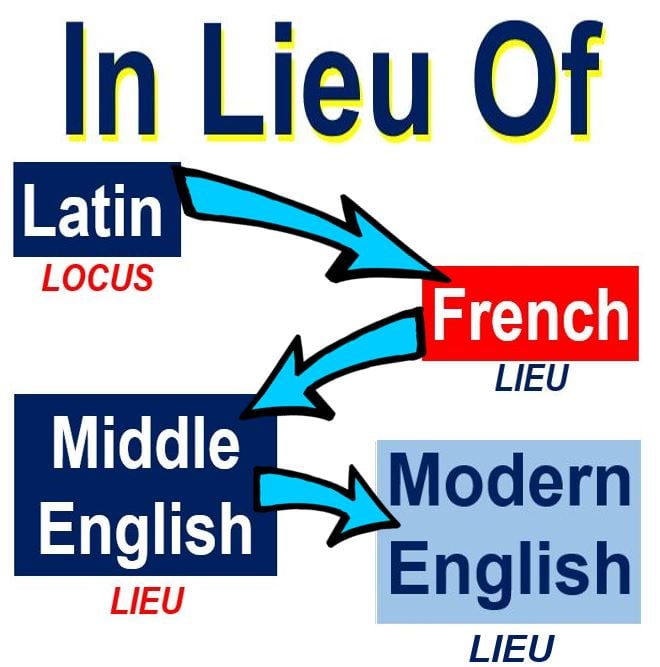In lieu of – Definition and meaning
In lieu of refers to something that replaces or substitutes something else – it is a common term used in business and finance, as well as non-commercial English. For example, a restaurant that has run out of celery, carrots and onions may serve tomato soup in lieu of minestrone soup.
An example of the term used in a simple business situation could be: ‘He gave me an IOU in lieu of cash.’
In lieu of can also mean ‘in light of’, as in the phrase ‘In lieu of recent events, more caution is needed.’ Although the term is used in this context, linguists say it is an example of ‘in lieu of’ used incorrectly.
 In Lieu Of came to Middle English via French from the Latin word ‘locus’, which means ‘place’.
In Lieu Of came to Middle English via French from the Latin word ‘locus’, which means ‘place’.
‘In lieu of’ is a hybrid phrase that means ‘in place of’ that originates from the Latin word locus, which means ‘place’ – it is partially translated from the current French phrase au lieu.
Deed In Lieu Of Foreclosure
A ‘deed in lieu of foreclosure’ is a potential option a mortgagor (borrower) can take to avoid foreclosure – the mortgagor deeds the collateral property, for example a home, back to the mortgagee (lender) in exchange for the release of all obligations under the mortgage. Both the lender and borrower must agree voluntarily and in good faith.
A deed in lieu of foreclosure is a possible option when a loan is in default – the borrower is unable to keep up with his or her mortgage payments – to avoid foreclosure proceedings.
The deed in lieu of foreclosure offers a number of advantages to both the mortgagor and mortgagee. The borrower is immediately released of all personal indebtedness related to the defaulted loan, avoids the public embarrassment of a foreclosure proceeding, may receive better terms than he or she would in a formal foreclosure, and does not have his or her credit rating so badly affected.
 According to Arts Council England: “[Acceptance in Lieu] enables taxpayers to transfer important works of art and heritage objects into public ownership while paying Inheritance Tax. If an offer is accepted, the taxpayer is given the full open market value of the item. The object is then allocated to a public museum, archive or library by the appropriate minister.” (Image: artscouncil.org.uk)
According to Arts Council England: “[Acceptance in Lieu] enables taxpayers to transfer important works of art and heritage objects into public ownership while paying Inheritance Tax. If an offer is accepted, the taxpayer is given the full open market value of the item. The object is then allocated to a public museum, archive or library by the appropriate minister.” (Image: artscouncil.org.uk)
For the lender it is simpler and cheaper than going through a repossession, and reduces the risk of borrower revenge (borrower damages the property before being evicted).
Acceptance in lieu
Acceptance in lieu is a provision in UK tax law under which inheritance tax debts may be written off in exchange for the acquisition of items of national importance or heritage.
Acceptance in lieu was first established by Chancellor of the Exchequer David Lloyd George as a way for wealthy individuals to pay the increased estate taxes imposed by his People’s Budget of 1909.
Today, things of national importance, such as country estates, works of art, antiques, and archive material are either collected and given to museums or the National Trust. The scheme is administered by Arts Council England. Hundreds of works of art, antiques, homes, and other collections have gone into publicly-accessible institutions rather than into auction thanks to the scheme.
Cambridge Dictionaries Online uses this scheme as one of its examples when explaining the meaning of ‘lieu’: “The paintings were left to the nation by the Duke of Norfolk in lieu of inheritance taxes.”
When an obituary says ‘in lieu of flowers’, it means that the grieving family is requesting that people make a contribution to a charity rather than sending them flowers.

